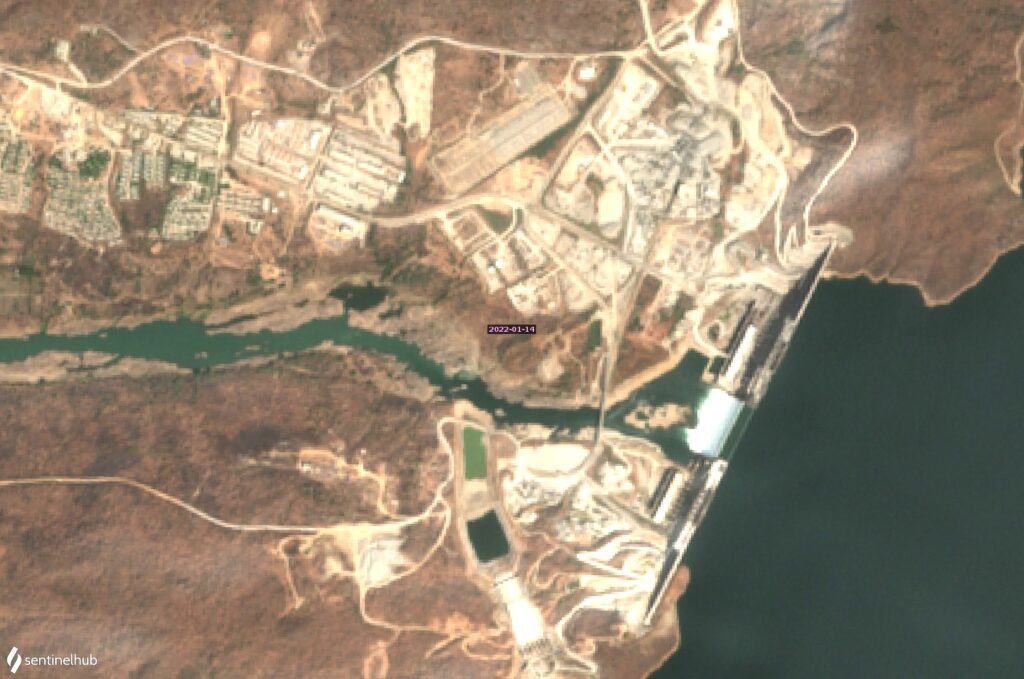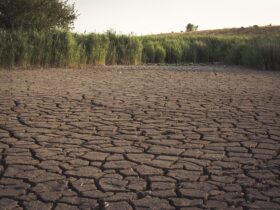In February 2022, the turbines of the Grand Ethiopian Renaissance Dam (GERD) — located nine miles into the Ethiopian side of the Ethiopia-Sudan border and on the Blue Nile tributary — were turned on and began generating electricity. Up and running after a decade of construction and deadlocked regional talks, Ethiopia considers this a victory and hopes the GERD will be a catalyst for economic development. In contrast, downstream countries Egypt and Sudan were less than thrilled; in their eyes this milestone signals a promise broken by Ethiopia and a threat to their water security.
To maintain peace between these three countries, who are the states most affected by the GERD, Ethiopia cannot make decisions about the dam unilaterally and needs to come to an agreement with Egypt and Sudan on water release quotas.
Ethiopia’s rationale for building the GERD is twofold: to expand access to electricity for its people and stimulate its flagging economy. Ethiopia has the second biggest electricity deficit in Africa — almost 70% of the country’s population is unconnected to the grid. This lack of electricity is also stifling an economy already bearing the consequences of COVID-19 and a deadly civil war. Unpredictable blackouts and power fluctuations routinely destroy equipment and force factories to shut down, costing business owners millions. Dr. Seleshi Bekele, Ethiopia’s former Water and Irrigation Minister and current chief negotiator and advisor on the GERD, has said that the dam will be “instrumental for clean and renewable energy” and “create access [for]65 million people without electricity.”
At full capacity, the GERD will quadruple the amount of electricity Ethiopia produces, creating a constant supply for civilians and businesses and a surplus to be exported to neighboring countries. The dam has already supported the economy by creating 12,000 construction jobs, and will increase crop yields by reducing sedimentation and regulating the Blue Nile’s flow. As Ethiopia’s economy is still dependent on agriculture, this is especially beneficial.
Egypt and Sudan recognize Ethiopia’s right to build the GERD, but worry about its implications for their water security. Yasir Abbas, Sudan’s Water Resources Minister, has said that “without an agreement, the GERD is really a threat to the people downstream […] both the environment and the livelihoods of the people.”
Egypt — dependent on the Blue Nile for 94% of its total water supply — is facing water shortages as a result of climate change and has begun restricting the cultivation of water-intensive crops. Ethiopia’s refusal to agree on a set amount of water to be released during drought years is making Egypt nervous that electricity production (optimized when the reservoir is full) will be prioritized above providing Egyptians with water.
Sudan is similarly reliant on the Blue Nile and shares Egypt’s fears, which turned into reality in 2020 when Ethiopia shut off the GERD’s diversion outlets without warning. This decreased the flow of water downstream and interrupted Sudan’s municipal and agricultural water distribution. Furthermore, because it is upstream from Sudan and so close to the border, simulations have predicted that the GERD breaking would cause every dam in Sudan to fail as well. The combined damage would flood the capital city Khartoum and much of the country’s agricultural basin, further incentivizing Sudan to push for lower reservoir levels.
An absence of international laws regarding transboundary rivers has left the three countries to come up with a solution amongst themselves. To Ethiopia, the operation of the GERD is an economic matter, whereas for Egypt and Sudan it is a question of access to a crucial resource. There is a fundamental imbalance in the severity of this issue for the countries on either side, and Egypt and Sudan are willing to escalate their response beyond harshly worded statements.
After another round of failed negotiations with Ethiopia in March 2021, Egyptian President Abdel Fattah al-Sisi issued a clear threat by declaring that “Egypt’s water is off limits. If anyone were to cross this red line, our response would affect the stability of the entire region.”
That same month, Egypt and Sudan signed a military cooperation agreement and the two armies conducted joint military exercises. By the end of 2021, Egypt had signed similar agreements with Kenya, Uganda, and Burundi, allying itself with more countries surrounding Ethiopia.
Should military action become imminent, international support would likely fall on the side of Egypt and Sudan. The two have made significant efforts to engage Ethiopia on the issue and have sought the help of numerous international mediators including the African Union, the European Union, and the United Nations. Ethiopia has rejected all proposals. Furthermore, the recent inauguration of the GERD’s turbines has been decried as a violation of the Declaration of Principles agreement signed by all three countries; this pact prohibits unilateral actions that affect the GERD.
One reason Ethiopia is clinging so tightly to sovereignty over the GERD is because of the dam’s role as a domestic rallying point. In recent years the country has been devastated by COVID-19 and the bloody civil war in Tigray, and the dam has served as a bright spot and uniting force. The government has also spread propaganda that Egypt and Sudan are trying to undermine Ethiopia; acquiescing to a binding agreement could portray it as weak.
These motives are not strong enough for Ethiopia to justify rebuffing negotiations. Compromising with Egypt and Sudan means that the GERD would generate less electricity than it is capable of, but there will still be a marked improvement over current production levels and tensions in the region will ease. Additionally, Ethiopia might be able to arrange for the GERD to operate at a greater capacity when the Nile has a higher-than-usual flow level, which occurs every seven years or so.
Despite incentive to do so, continuing to ignore Egypt and Sudan and make unilateral decisions about the GERD is not in Ethiopia’s best interest. The best-case outcome would be maintenance of the status quo and continued tension in the region. This will not last forever; no country will allow a resource as critical as water to be controlled by a foreign power. Egypt and Sudan have demonstrated that military action is not off the table, and they will eventually run out of patience. Compared to the marginal benefits of governing the GERD independently, the cost of doing so — the potential for a war that will take too many lives and further decimate a country and the very economy it is trying to improve — would be far greater.






